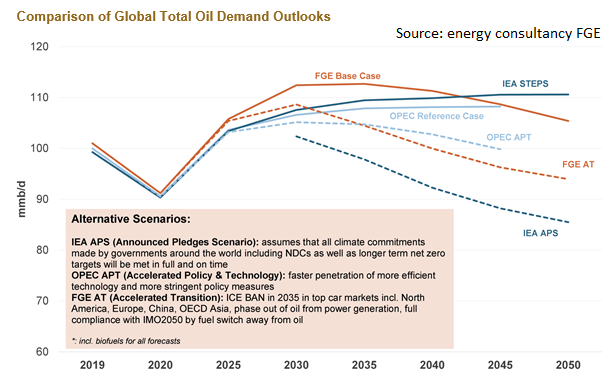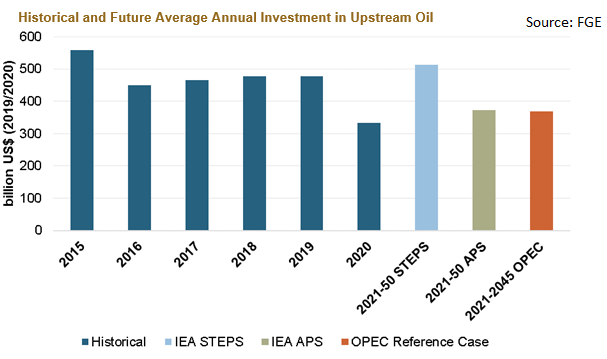Advertisement
Advertisement
Twin Peaks: Whether It’s Supply or Demand, Oil Era Heads for Crunch Time
By:
(Reuters) - Energy transition and peak demand predictions have spooked investors in oil, putting the prospect of peak production sooner than anticipated accompanied by wild price spikes.
Key climate talks are set to begin at the end of this month in Glasgow, Scotland to tackle global warming under the 2015 Paris Agreement, with fossil fuel in policy-makers’ crosshairs.
But as it stands now, mobility curbs which hollowed out both spending on upstream oil projects and oil end use may already be set to permanently rein in the growth of both supply and demand.
“On current trends, global oil supply is likely to peak even earlier than demand,” the research department of bank Morgan Stanley said in a note this week.
“The planet puts boundaries on the amount of carbon that can safely be emitted. Therefore, oil consumption needs to peak. However, this is such a well-telegraphed prospect that it has solicited its own counter-response already: low investment.”

Still, with most oil producers and watchdogs putting the peak to the world’s thirst for oil at least several years away, demand is already veering back toward pre-pandemic levels.
The mismatch between demand for oil and other polluting fossil fuels roaring back to normal and output having lagged has helped contribute to an energy crunch in Europe and Asia, with crude prices soaring to multi-year highs.
The medium-term erosion of oil demand supposes that renewable energies like electric cars and wind power gain pace, which the International Energy Agency says needs to pick up fast in order to head off shortages and sky-high prices.
“The amount being spent on oil appears to be geared towards a world of stagnant or falling demand,” the Paris-based agency said in its annual outlook this month. “A surge in spending on clean energy transitions provides the way forward, but this needs to happen quickly or global energy markets will face a bumpy road ahead.”
The IEA does not predict an immediate peak to oil supply, with producer club OPEC and Russia comprising a rising share of supply in the next decade.
OPEC’s annual outlook last month saw global supply nearing a plateau in 2045 but no clear peak.
Despite the pitfalls to prices and supply, the IEA said current low oil and gas spending was one of the few areas aligned with its most ambitious Net Zero Emissions by 2050 (NZE) scenario in which no new fossil fuel projects should go forward.
In its most conservative status quo, or stated policies scenario (STEPS), however, average annual spending on oil to meet demand would need to rise sharply to above $500 billion – more than at any time in the last five years.

Energy consultancy FGE said in a note the problem was not an immediate one, but could come to a crescendo in coming years.
“Although there are huge concerns regarding the state of upstream oil investment i.e. that, as it stands, it is insufficient to meet growing demand in the years ahead, this is a problem for 2023 and beyond not for the next 12 to 18 months.”
For a look at all of today’s economic events, check out our economic calendar.
(Reporting by Noah Browning; editing by David Evans)
About the Author
Reuterscontributor
Reuters, the news and media division of Thomson Reuters, is the world’s largest international multimedia news provider reaching more than one billion people every day. Reuters provides trusted business, financial, national, and international news to professionals via Thomson Reuters desktops, the world's media organizations, and directly to consumers at Reuters.com and via Reuters TV. Learn more about Thomson Reuters products:
Advertisement
